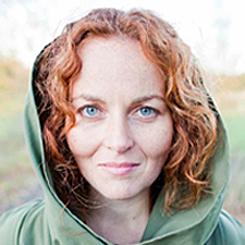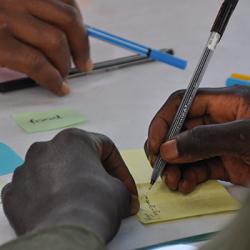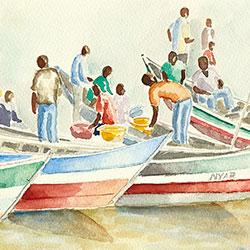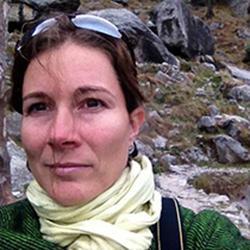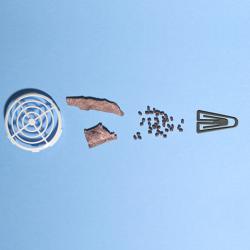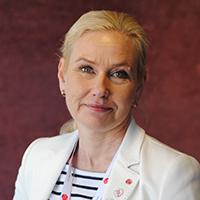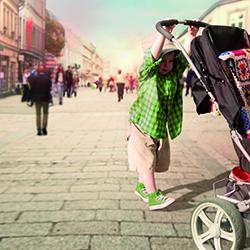Wild Poethics – New doctoral thesis
“Nature is not something separated from the city”. That is the first sentence in the abstract in Anna Maria Orrú’s newly published doctoral thesis Wild Poethics – Exploring relational and embodied practices in urban-making. Anna Maria is based at the Department of Architecture and Civil Engineering at Chalmers University of Technology, Sweden. Her research has been supported by Mistra Urban Futures and is also part of the ‘Architecture in the Making’ programme at the Swedish Research School in Architecture (ResArc).
Urban gardening, artistic research and biomimicry
Anna Maria’s research emerges from the act of urban gardening, artistic research and biomimicry. Biomimicry is an approach to innovation that seeks sustainable solutions to human challenges by imitating nature’s time-tested patterns and strategies.
There are several platforms in which she has collaborated and disseminated her research; Gröna Linjen in Stockholm and AHA! Festival in Gothenburg are two of the movements she both was privy to initiate, construct and that has also used in her research process.
Poethical voyage
The thesis takes the readers on a voyage of poethical proportion – poetic, political and ethical. The readers travel to a fictional Island of Encounters reaching four destinations: Alba (body/curiosity), Agora (fiction/performance), Clinamen (atmosphere/imagination), and Plūris (metaphor/swarming). The journey’s challenge is two-fold: to generate embodied methodologies in urban-making to approach relational space matters, and to stage space for naturecultures in order to encourage vibrant materialist relations so as to bypass the ruling and paralysing attitude of the Anthropocene.
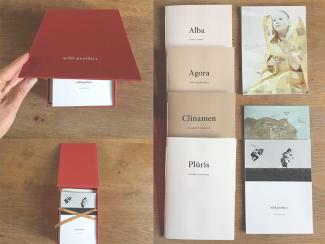
What has been the focus of you research Anna Maria?
The term ‘poethics’ is a crucial catalyst as it aims to encourage ecological ethos as a poetic and political embarking, and reconfigures it into a mode of relationality. Alongside poethics is the term ‘wild’ which hints at the ecological ethics driving the research, but also gestures to the complexity of nature. The thesis intends to find new ways of becoming environmentally responsible by exploring the implications of the corporeal in critical spatial practice taking into consideration naturecultures. It is concerned with exploring and developing alternate embodied methodologies for how the body can be involved in ecological urban-making and becoming responsible, says Anna Maria.
Main results
In order to look at different movements, performativity and complexity in urban-making, Anna Maria have brought the body into a spatial discourse to explore relationality and embodied knowledge generation. Though her starting point has been a concern with sustainable food behaviour in urban environments and the passive use of urban green spaces, she found that the corporeal research became critical to the research. The research challenges an understanding of relationships; with others, with nonhumans, with space and matter, with time, and with nature, and how to ‘be’ in the world, or rather, how to poethically ‘become’ in the world given the gross impact from environment degradation. She aimed to build on an architectural understanding of production, thinking, making and relating, using artistic-based embodied methodologies in urban-making.
In her findings, the body emerged as a valid membrane and interface for critical practice, especially in the realm of ecological work and processes. All the thesis encounters explored ways to deepen environmental commitments with urban space, primarily shaped and strengthened through corporeal and sensorial behaviour – essentially through visceral means by placing involved participants in movement.
The embodied methodologies coming through with most potential were the ones that enabled a relational and reflective experience of materiality. The explorations brought the relational in as a reoccurring finding from a variation of angles; relation to space (encounter 1), relation to knowledge (encounter 2), relation to atmosphere (encounter 3) and to other bodies (encounter 4).
The embodied methods foster new expressions of architectural representation in the design process and should be included in the pedagogics of architecture. The performance in and of space through these imaginings brings up specific tensions that could be used for understanding the relationality that a space conjures up. Outcomes steered towards the making of deep commitments to environmental urban behaviour which necessitates the body to be fully included and present.
Exhibition
There is a current exhibition that showcases the PhD work of Anna Maria Orrù. It includes six films that form part of the thesis. Alongside the films, there is the Chalmers printed book, but also a mock-up box publication of the thesis’ graphic intention - as a treasure box for embarking on a journey. In addition there are seven small art-book publications from Vegetable Lamb Press (wooden box) that also form part of the PhD work. The exhibition is shown in the reception of SB-building, 3rd floor, Chalmers, Gothenburg, November 29 - December 8, 2017. Read more.
Phd defence
The defence of the thesis will take place December 7th, 9.15, Lecture hall SB-H5, Chalmers University, Gothenburg. Supervising team has been Catharina Dyrssen, Chalmers University of Technology and Nel Janssens, St. Lucas (with Jaan-Henrik Kain, Chalmers, as secondary supervisor till in the first 2 years)
The examining committee consists of Doina Petrescu, The University of Sheffield, Elke Krasny, Academy of Fine Arts Vienna, Austria, Derek McCormack, University of Oxford and Gunnar Sandin, Lund University.
Read more about the PhD project A Biologically-Centered Framework in Urban Foodscapes.
Questions?
Please contact Anna Maria Orrù, Chalmers University of Technology, orru@chalmers.se
